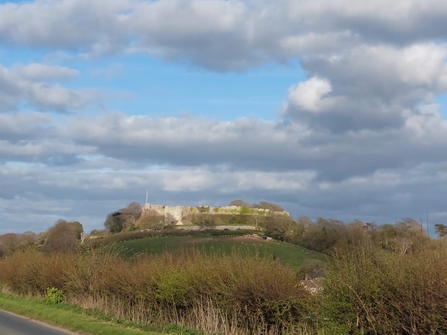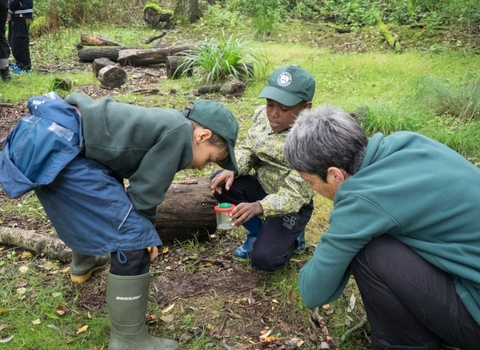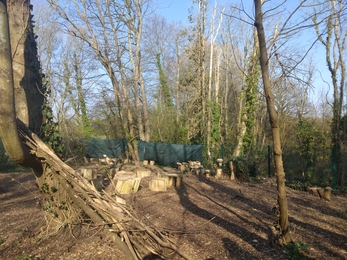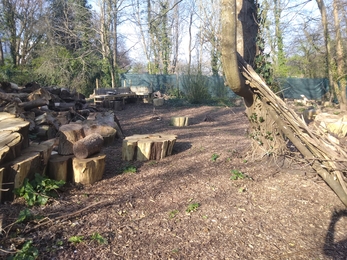If you have ever driven down Carisbrooke’s busy high street, you will be surprised to find out that just metres from the road is a quiet haven, where bats rest on their long journey, and ducks paddle happily in the stream. This haven for wildlife belongs to St Thomas of Canterbury Primary School, now part of the Wildlife Trust's Wilder Schools programme. I had the great opportunity to have a look around the school's extraordinary green spaces with Kelly Wetherick, Wilder Wight Communities Project Officer.

© Ellie Cody
It was a warm day for March and very sunny. Walking into the school playing field was like walking into an oasis of calm, despite only being a stone’s throw from the high street. From there, we had a view across the tops of the houses, straight to the magnificent castle, and the noise of the traffic was drowned out by birdsong. I felt instantly calmer, in that wooded dell, flanked by a quiet stream and carpeted with fragrant wild garlic, so I can only imagine the effect it must have on the children for whom it is part of their regular lessons!
Bequeathed to the school at the beginning of the first lockdown, this remarkable patch of land used to belong to the nuns at Carisbrooke Priory, before passing to the diocese. Because of this, it has remained undeveloped and unspoilt for 50 years, enough time for it to be called home by a variety of interesting animals. Sightings of buzzards, badgers, foxes, and that childhood favourite - ducks, already enliven the school day, and plans are afoot to encourage bats and red squirrels to move in. It is full of possibilities, and they look forward to continuing to enhance the space for children and wildlife together. There is already a wildlife pond under construction and plans for an insect hotel so that children can learn about the varied life cycles of the animal kingdom while creating a healthy thriving habitat.
As an educational resource it is rich with possibilities, of which the teachers are making full use. So far, the space has been used in the teaching of maths, science, and religious education, as well as more Forest School lessons. In fact, the school uniform has been changed to tracksuit bottoms so that the children can use the greenspace on any day without worrying about getting dirty. As such they are free to indulge their young imaginations, playing in the mud kitchen, exploring the woods, and taking risks in a supported environment, to help build their self-esteem and independence. They are gaining a good knowledge of our native wildlife, at the same time as gaining a knowledge of themselves.
Certainly, its positive impact on children’s wellbeing has already been observed. While it is grounding for all children, calming them down and refreshing them, it is especially good for those children who really struggle in the classroom environment. Mrs Booth, who showed Kelly and me around, agreed how remarkable it is to watch children who are usually reluctant to contribute in the classroom, gain confidence and lead their peers in this outdoor setting. Furthermore, behaviour is improved by having access to nature, since it has a very calming effect when emotions run high. I can see now how this will have an invaluable impact on the children’s lives, especially as some of them lack access to the Island’s beautiful countryside outside of school hours. Many of us remember the green spaces we used to play in as children, perhaps bemoaning that the children of today lack such unfettered playtime. It fills me with confidence for the future, knowing that schools like this exist, where children can learn from nature as they have been doing since the first child was born.
Written by Ellie Cody, Totland
Ellie is Wilder Communications Champion for Hampshire & Isle of Wight Wildlife Trust. She is passionate about writing and inspiring people to take action for nature.

© Rex Waygood
Feeling inspired?
Help us create a Wilder Future.
We’ve reached a point where our natural world is in critical condition and needs our help to put it into recovery. It’s not too late to bring our wildlife back, but we must act now.
We welcome schools and education centres to join #TeamWilder and create a #WilderFuture for the next generation.



